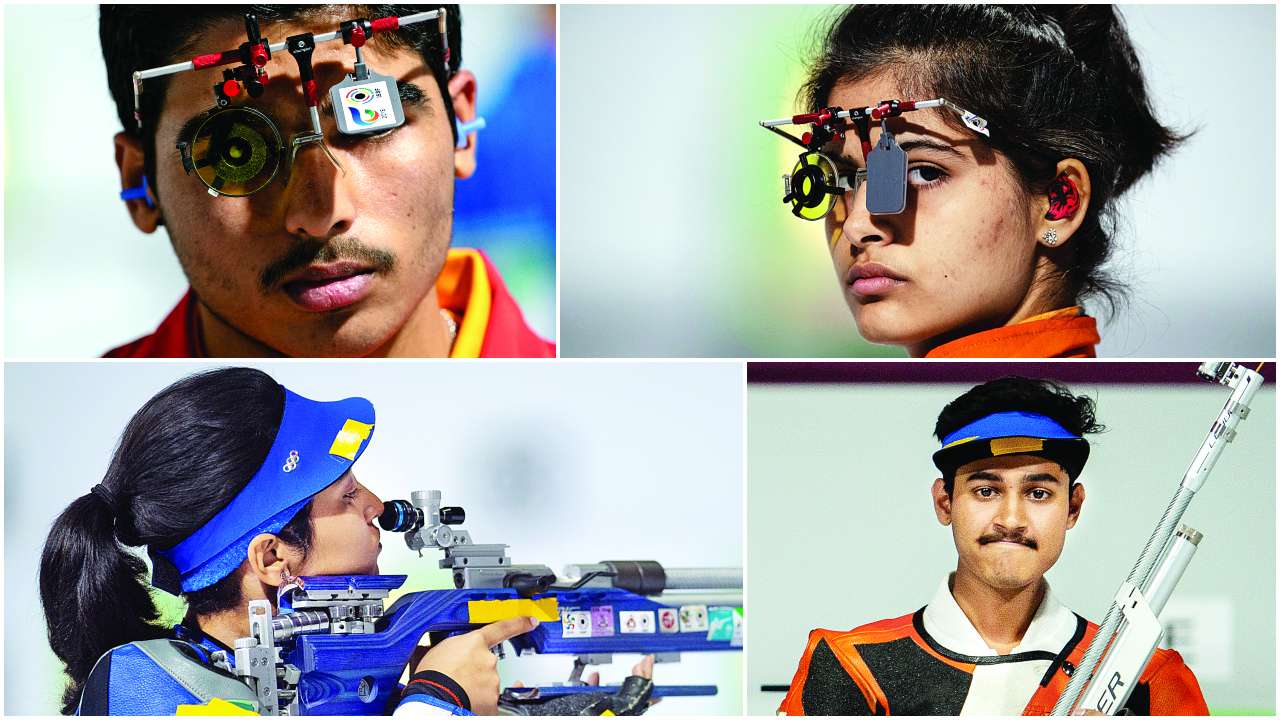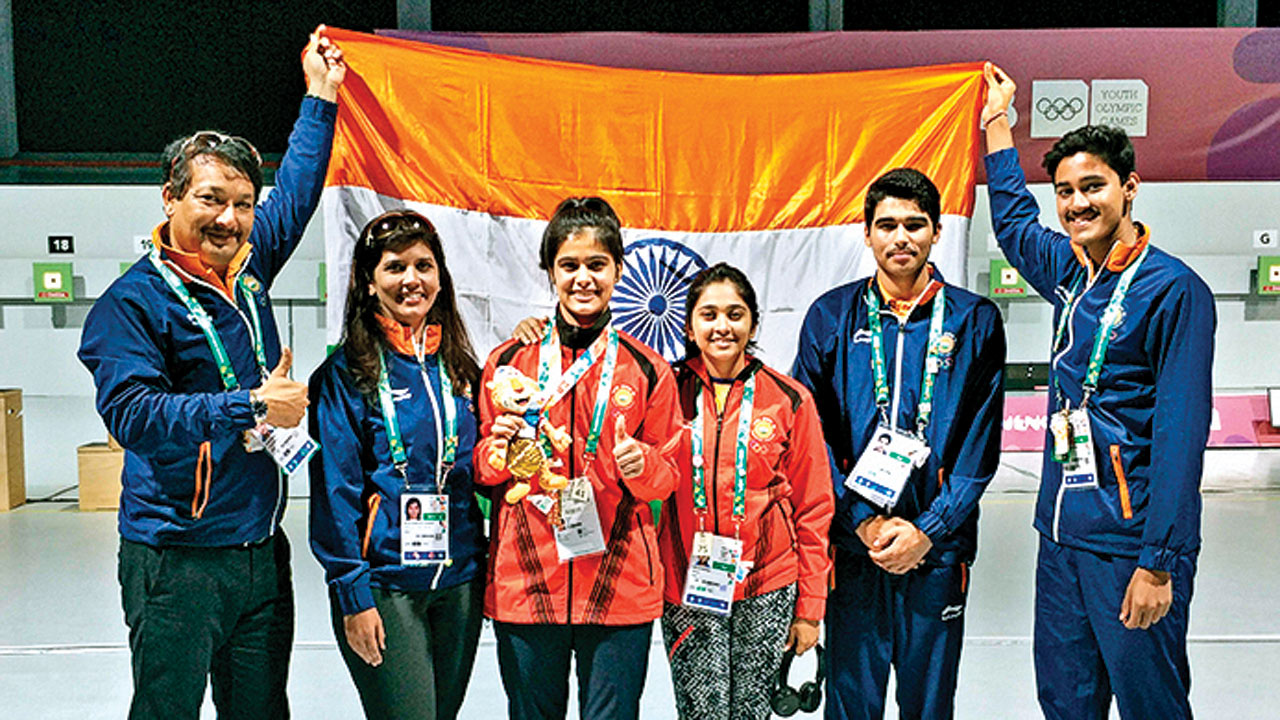India's young guns – handle with care

Indian shooters (Clockwise from top left) Saurabh Chaudhary, Manu Bhaker, Shahu Tushar Mane and Mehuli Ghosh have shot to limelight with medal-winning performances in mega events throughout the year Photos: OIs/IOC
Last week, young Manu Bhaker signed off Indian shooting's campaign at the 2018 Youth Olympic Games (YOG) by pocketing a silver — her second medal — in the 10m air pistol mixed international, although it was an event of little relevance.
Yet, it was a cherry on an incredibly sweet cake that the Indian shooters served at these Games in Buenos Aires, with all the four youngsters from the country winning a medal in their respective individual events.
Two gold, two silver and another bonus medal in the mixed team. Time for the boys and girls to celebrate their achievements, you would think?Nay.
Manu won the final medal on Friday, and yet all the four shooters were summoned to their daily yoga sessions at 5am on Saturday by Jaspal Rana, the chief junior national shooting coach for pistol, who is with the kids in Buenos Aires.
"This is no time to go over the top with celebrations," Rana told DNA. "I told them to wake up at 4.30am, do their yoga session, took them to the gym and made sure that they stick to their normal training routine. I have to keep them updated with the reality of life."
That reality, as Rana puts it, is that the higher one goes, the greater are the chances of a fall.
These are words India's young shooters would do well to copy-paste in their minds.
There's no doubt that Indian shooting is at its best phase now, with a bagful of youngsters shining bright and even giving the established Indian shooters a run for their money.
The YOG merely reiterated this fact, with Bhaker and Saurabh Chaudhary winning gold and Shahu Tushar Mane and Mehuli Ghosh silver in their respective individual events.
The performances of these four teens, and a few others over the course of this year, have only proved that India's shooting stocks are rising higher.
However, the hope that these shooters will continue to excel and raise the bar higher comes with an important rider: handle them with care.
"That is the biggest challenge," Rana said. "Fortunately, I'm good at that: keeping them grounded. I have seen that in my life, seen the life of celebrities and the traps that they can fall into.
"Right now, these kids are very sought after, they have to attend functions, fulfil commitments. But they have to realise that you're required only when on top, no one will ask for you when your performances go down," Rana, a four-time Asian Games gold medallist, added.
 ((L-R) Coaches Jaspal Rana and Suma Shirur with Manu Bhaker, Mehuli Ghosh, Saurabh Chaudhary and Shahu Tushar Mane in Buenos Aires)
((L-R) Coaches Jaspal Rana and Suma Shirur with Manu Bhaker, Mehuli Ghosh, Saurabh Chaudhary and Shahu Tushar Mane in Buenos Aires)
Dangers Of Instant Fame, Money
The perils of instant success can be damning, especially for young boys and girls and in this day and age of social media.
Bhaker, one of the most talked-about teens in Indians sports at the moment, has thousands of followers on Twitter, and so does Ghosh.
These young shooters' medal-winning efforts in various competitions this year — be it the Commonwealth Games, Asian Games, World Championships, World Cup or YOG — have exposed them to the world of instant fame, money, attention, endorsements et al.
Distractions aplenty, these.
And, to keep them as much away from it as possible is where the coaches come in. Passionate coaches, as Suma Shirur likes to define them.
"We have to groom them in every aspect," Shirur, high performance coach of the Indian junior team (rifle), said from Buenos Aires.
"Apart from general coaching, we have to teach them a lot of values, which are necessary to keep their performances going. That is the biggest task.
"They are bound to have distractions of fame, money and with so much social media usage nowadays. Apart from this, they're teens, and thus will have other issues like crushes and attractions.
"So, we will have to deal with all this and keep them busy with their daily routines. It would require a lot of counselling," Shirur, a two-time Asiad medallist, added.
Both Shirur and Rana have charted out a fixed daily schedule for their junior shooters in the national programme, one that starts at 4.30am and ends by 9pm at the latest. Usage of phones is allowed for only one or two hours a day, strictly.
"We deprive them of certain things, which doesn't help. But they need to connect with themselves internally, and phones and social media do not help with their concentration levels," Shirur said.
She believes that coaching these juniors is not just restricted to the coaching aspect, it spreads its wings to a bit of parenting and counselling as well.
"It is not just about those three hours on the shooting lane. We have to look at it from a holistic point of view, right from 5am until they sleep. You have to keep them engaged," Shirur said.
Rana, though, hopes that these kids also pick up the art of self-learning.
"They're teenagers, and these distractions will have an effect on them. But we can only make them understand what is right or wrong. In the end, they have to taste the bitter taste of life themselves," he said.
Learning To Deal With Expectations
Dealing with distractions is one thing, but the burden of expectations quite another.
So far, these young shooters entered almost every international competition with a nothing-to-lose attitude. The scenario won't quite be the same anymore, and dealing with people's expectations can put even the best under immense pressure, let alone youngsters.
Bhaker's Asian Games disappointment after the high of her World Cup and Commonwealth Games outings was a timely reminder of that.
"It's wrong to assume that these kids will perform at the same level all the time," Shirur said. "They may or may not be able to, and people need to understand that. They are growing up children, and they will have ups and downs.
"But as long as the system is in place, new kids like these will keep coming in and giving them stiff competition. The cycle will keep running," she added.
While the country might be banking upon these talented youngsters for a medal at the 2020 Tokyo Olympics, Shirur said it is imperative for them to not stress upon it.
"We don't discourage them from thinking of the Olympics. But, we make them think of the Olympics as a goal, not a dream. There's a distinction there. It's important for them to keep their focus on their daily routine, and not think too far beyond themselves," she said.
Rana said there is no running away from expectations, and it is up to these young minds to learn how to deal with it.
"Look, these kids will get burdened by expectations. We're not dealing with fools," Rana said. "But they will learn. We know there is pain, and we have to make them strong enough to get through the pain.
"The worst feeling is when you're on top and then you fall. So, they will fall, no doubt. But how they pick themselves up will define them," he added.